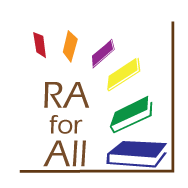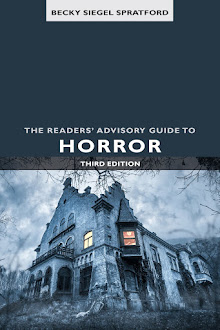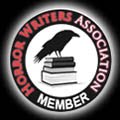Sometimes I take a wild stab at titles to include in my LJ Review column. Well, not completely wild. I make an effort to focus on select publishers and make sure they are represented. In this case, Nightfire had an intriguing, debut coming in February, Your Shadow Half Remains by Sunny Moraine.
I requested it with no further information than the publisher's summary and what I got in return was a book that is "horrifyingly banal," with multiple layers of discomfort, and an engaging narration. Those quotations marks are from a phrase in the book itself.
Here is my full review for more context:Riley lives alone, on the shores of an isolated lake, in the home that belonged to her grandparents, that is, before they murdered each other, because Riley lives in a slowly collapsing world where for the last two years, looking a human in the eye, be it a real person, an image, or even a reflection, will lead them to violence, killing everyone near them including themself. Until the day she meets Ellis on the road, and Riley dares to connect with another human. Riley is an engaging narrator, recounting the "horrifyingly banal"* downfall of society, drawing readers in with a mixture of details from”then” and philosophical consideration about “now,” gaining their trust even as she is slowly becoming less and less reliable. Creepy from its very first lines, with unease seeping out of every sentence, this deceptively quiet rollercoaster of intense unease, palpable emotional trauma, and engrossing menace, will appeal to a wide swath of readers.
Verdict: While the set-up warrants comparisons to Bird Box by Josh Malerman or The Violence by Delia S. Dawson, the reading experience with its multiple layers of discomfort, is reminiscent of Things Have Gotten Worse Since We Last Spoke by Eric LaRocca.
If you click through you can read even more.
Immediately after finishing this book, I contacted Moraine, and asked them to consider participating in Why I Love Horror.
Please welcome Sunny Moraine as they share why Horror is the place where we can all feel fully human.
💀💀💀💀💀💀💀💀
by Sunny Moraine
Now and then I do in fact wonder how I got to where I am now, as someone immersed in horror both as creator and as audience, because if you met me as a kid, you never would have pegged me for a future gorehound.
I should be clear that I say “gorehound” a bit tongue-in-cheek here; I appreciate a good spout of gore, I get a kick out of it in my horror media, but I wouldn’t say it’s primarily why I come to the genre. The fact remains that when I was young I didn’t have much tolerance for horror at all, gory or otherwise. I was a lonely, bookish kid with—like many lonely, bookish kids—an overwhelmingly powerful imagination, and as such, the feelings induced by the conjurings of that imagination were often correspondingly overwhelming. I was easily scared, and frightening images stuck hard in my brain. I was well into adolescence before I could watch the Chestburster Scene in Alien (now one of my favorite films) without covering my eyes.
Yet at some point, something changed. Something in the vibe of horror reached out and gripped me by the guts and hasn’t let go. I don’t recall exactly when that was, or what the catalyst happened to be; it might have been reading The Shining one summer, or watching Jacob’s Ladder (now one of my favorite films) for the first time. What matters is that there came a time when those frightening images lingered, and instead of wanting them out of my head, I wanted them to stay.
They were compelling. They were even bizarrely comforting.
By the time I hit adolescence, I wasn’t only a lonely, bookish kid; I was a mentally ill kid, a neurodivergent kid, a queer kid who didn’t know yet that they were queer, with an increasingly difficult home life. So I think part of what happened is that the world itself became more unpredictable, more frightening—and more monstrous, not least because I was feeling more monstrous. My mental illness—primarily OCD—was manifesting in disturbing ways, most immediately in persistent dermatillomania, which is a form of compulsive self-harm as a way to self-soothe. So what I was dealing with wasn’t only the experience of my own mind turning on me, but also of my own body becoming a site of perversely comforting violence.
So horror—especially of the Stephen King variety—presented me with stories in which powerful evil could be confronted and maybe, against all odds, defeated.
But it also presented me with stories in which monsters could belong. In which they could confront normality as an enemy and destroy it, and in which they could seize their own power. Other kids found me strange and disturbing? Fine; maybe being strange and disturbing wasn’t so bad. Maybe, in a monstrous world, a monster is precisely what one ought to be.
That was a long time ago, and I’ve gotten much better. I’ve grown up, I’ve gotten married, I’ve made friends and found fellow travelers, I’ve discovered things I’m good at and carved out a life which is meaningful to me. I understand much more of where my power is, and I’m much more comfortable with not having any control over most of the world—or at least I’m more comfortable with the discomfort. But my attraction to horror has only intensified, and I think the reasons largely remain the same.
I love the uncanny in horror, because I feel uncanny. I love the things that alarm and disturb, because I frequently feel alarmed and disturbed, and I want to learn to live with those emotions rather than constantly fighting them. I love the presentation of the world as dangerous and frightening, because the real world seems more like that every day, and stories reflecting that reality is affirming for me. Perhaps most of all, in many ways I still feel essentially monstrous—and this is where I have to note that there’s something intrinsically queer about a lot of horror in that respect. It’s a counterintuitively safe place for what can’t help but stand against the accepted, the comprehensible, the normal and normative. It’s a place where it’s all right to admit that the abyss holds a certain allure.
It’s also a place where, because the deepest kinds of darkness must be faced, every fragile little flicker of light is that much brighter. Because of the presence of despair, every shred of hope one manages to claw free feels so profoundly earned. Those are often my favorite stories: where things get as bad as they can, where people spiral into the worst places imaginable, and then somehow succeed in carrying on in spite of everything. Maybe they don’t win, maybe even an uplifting ending is uplifting in only the most tenuous way, but they manage to hold onto some crucial piece of themselves.
One of my other favorite films is the 2015 psychological horror indie They Look Like People, which focuses on Wyatt, a man in the grip of terrifying schizophrenia, and Christian, Wyatt’s old friend who doesn’t know how to help Wyatt even as Christian is struggling with his own depression and anxiety. Wyatt is convinced that the world is on the verge of a demonic invasion, and he’s the only one who can do anything to fight back and save himself—not because he’s some sort of messianic figure but instead because he’s cursed to be the only one who sees it coming. (SPOILER ALERT) This conviction leads Wyatt to the verge of unspeakable violence against Christian, yet the film never allows us to stop feeling intense empathy for him and his distress. At the very last minute, Wyatt rejects his delusions, and he and Christian—who has reacted to Wyatt with courage and love and acceptance even though he doesn’t fully understand what’s wrong—embrace. That’s where the film ends: not with Wyatt conclusively getting better or Christian conclusively conquering his own debilitating emotional issues but simply with two broken men together in the darkness, having managed to find hope in each other in spite of their terrible brokenness.
I do love horror that ends in the bleakest places, too, where there’s no hope to be found at all. But I think my favorite stories are the ones that end the way They Look Like People does, where the awfulness of the world is fully realized and never defeated but somehow still doesn’t have the last word. And I really think you get that in horror in a way you rarely do elsewhere. You only find that kind of light in a place where the darkness is allowed to be nearly impenetrable.
You survive, and then it’s up to you to decide what the fact of your own survival means.
In some ways, while it makes a home for those of us who always feel a little bit like monsters, horror is also a place where we can discover what makes us fully human. And I can’t help loving that.





No comments:
Post a Comment